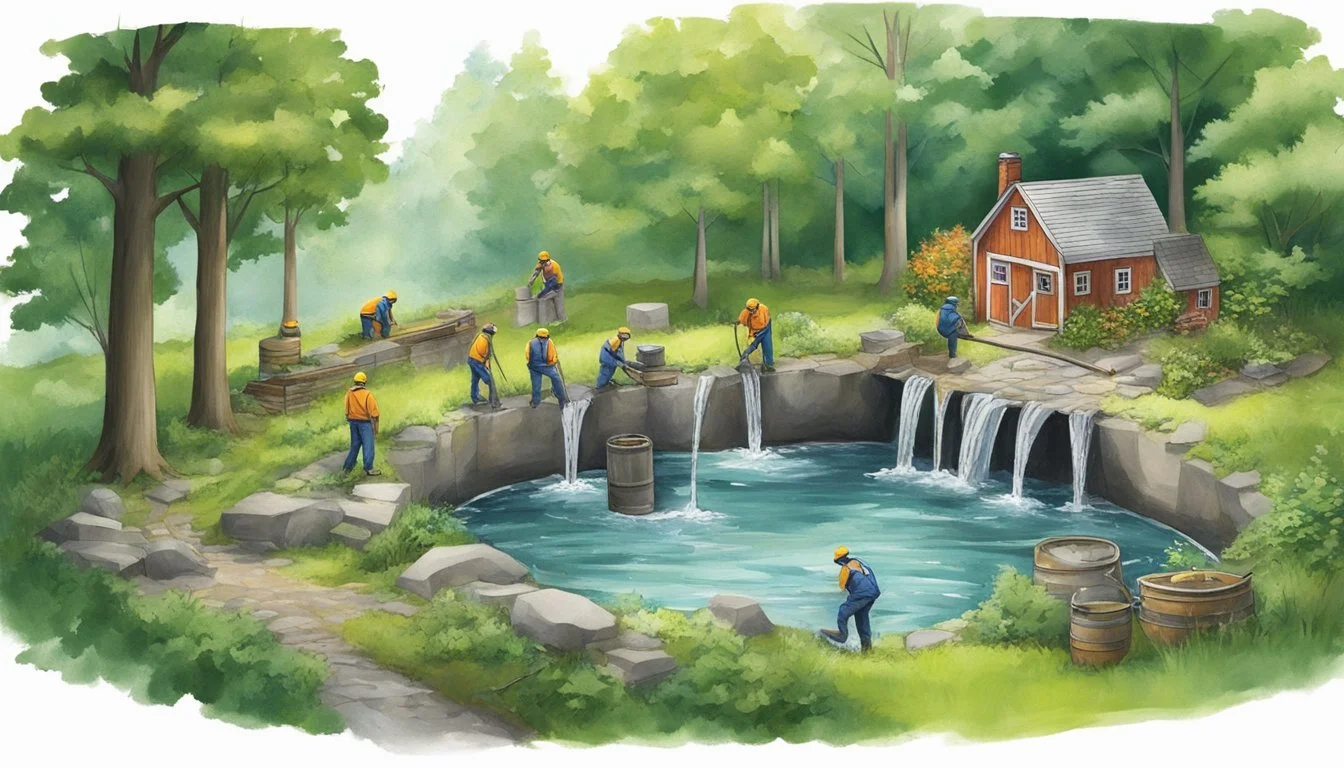Water Rights in Vermont
Understanding State Regulations and Access
Water rights in Vermont are deeply intertwined with environmental policies and regulations that establish the framework for managing the state's water resources. These rights involve a variety of stakeholders, from individual landowners to public institutions, and encompass both usage and conservation aspects. In Vermont, the public trust doctrine plays a crucial role in ensuring that water resources are preserved not only for present-day Vermonters but also for future generations. It declares that the state's significant water bodies, including lakes and rivers, are held in trust for the public and must be managed accordingly.
The Department of Environmental Conservation of Vermont is a key entity entrusted with overseeing water laws and regulations within the state. These regulations, formulated to safeguard potable water supplies and maintain water quality standards, reflect Vermont's dedication to protecting these vital natural resources. Ensuring access to safe drinking water and regulating activities that may impact water quality, such as land development and waste disposal, are priorities under the state's jurisdiction.
Navigating water rights implies understanding the complex balance between private property interests and public welfare. Vermont's laws are structured to address the state of water as a critical resource affecting health, the environment, and the economy. These waters are essential not only for drinking but also for recreational activities, wildlife habitats, and agricultural uses. Consequently, lawmaking and judicial decisions in Vermont, from water supply rules to wetland protections, aim to sustainably manage water resources aligning with the state's environmental ethos.
Historical Context of Water Rights in Vermont
In Vermont, water rights have developed through a combination of court decisions and legislative actions that have shaped the relationship between land ownership, water usage, and public access.
Public Trust Doctrine
The Public Trust Doctrine is a legal principle that has evolved significantly over time, affirming that certain natural resources like water are preserved for public use. In Vermont, this doctrine has been integral in protecting the rights of the public to access and use bodies of water. The Vermont Supreme Court has played a key role in interpreting and upholding the doctrine, ensuring that water resources are managed in a way that balances private interests with the needs of the public.
Development of State Regulations
As Vermont's water resources came under increasing demand, the state saw the need for more structured regulations. The General Assembly of Vermont has been instrumental in enacting statutes that govern water use and allocation. These regulations are codified in Vermont Statutes Online, providing a comprehensive legal framework for managing Vermont's water resources. State regulations have been developed to address everything from water withdrawal and pollution control to the establishment of minimum stream flow standards, reflecting the state's commitment to both protecting and responsibly managing its water resources.
Legal Framework for Water Rights
Vermont's approach to water rights is shaped by a combination of state statutes and administrative regulations that ensure the responsible use and protection of its water resources. The state's legal framework is primarily outlined in Title 10: Conservation and Development, and is supported by the Groundwater Protection Rule and Strategy which further aims to safeguard groundwater from contamination and overuse.
Title 10: Conservation and Development
Title 10 of the Vermont Statutes Annotated serves as the legislative backbone for environmental conservation and development in Vermont. It includes provisions for water resource management, detailing the rights and responsibilities of landowners and state agencies. The statute emphasizes that water is a public resource and that any use should reflect the public interest and environmental sustainability. Vermont has enacted various regulations under Title 10 to guide water appropriation and ensure that the policy for the use of surface and groundwater is consistent with public welfare.
Groundwater Protection Rule and Strategy
The Groundwater Protection Rule and Strategy is a pivotal part of Vermont's policy for managing its water resources. This regulation underscores the state's commitment to maintaining the quality and availability of groundwater. It establishes criteria and procedures for the designation of protected groundwater areas, sets forth a framework for the issuance and management of withdrawal permits, and outlines the standards for both short-term and long-term groundwater protection. The strategy is proactive, aimed at preventing contamination and overuse before these become issues, thus ensuring a sustainable supply of clean groundwater for future generations.
Groundwater Withdrawal
In Vermont, management of groundwater resources is carefully regulated to ensure sustainability and equitable access. This encompasses stringent requirements for withdrawal permits and meticulous reporting to ensure compliance.
Groundwater Withdrawal Permits
Individuals or entities in Vermont looking to withdraw more than 20,000 gallons of groundwater per day are required to obtain a groundwater withdrawal permit. This is essential to ensure that the extraction does not adversely affect existing water rights, streamflow conditions, and the natural environment. The Groundwater Withdrawal Reporting and Permitting process is overseen by the Vermont Department of Environmental Conservation (DEC), which evaluates applications with a focus on the proposed use's quantity and impact.
Criteria for Exemptions:
Groundwater used for fire suppression or emergencies
Domestic residential use
Agricultural requirements
Dairy processing
Licensed public water systems
Reporting and Compliance Requirements
Once a permit is issued, permit holders are mandated to report their water usage annually. These reports are critical for monitoring groundwater utilization and for the maintenance of a sustainable water supply. Groundwater withdrawal requires adherence to a reporting schedule, with penalties for non-compliance.
Annual Reporting Obligations:
Report previous calendar year's water usage
Submit Groundwater Withdrawal Reporting Form for each site
Failure to report can result in legal and financial consequences
Entities engaging in groundwater withdrawal are also subject to the potable water supply permit regulations, which address the concern for providing safe drinking water to the public. The DEC works diligently to enforce these regulations, as non-compliance poses risks to both public health and Vermont's groundwater ecosystem.
Groundwater management in Vermont reflects a commitment to maintaining the balance between water demand and natural resource protection.
Drinking Water Standards and Protection
In Vermont, stringent regulations safeguard the quality of drinking water for its citizens. These regulations encompass both the operation of public water systems and the processes that ensure water meets health standards.
Public Water System Regulations
Public water systems in Vermont must adhere to rules that enforce the safe provision of water to communities. This includes the Water Supply Rule which was updated and became effective on March 17, 2020. Under this rule, systems serving 25 or more people fall under a set of regulations that dictate the management, operation, and emergency protocols to assure the consistent supply of safe drinking water.
Drinking Water Quality and Testing
The quality of drinking water in Vermont is maintained through regular testing and adherence to established standards. The Drinking Water and Groundwater Protection Division is tasked with ensuring that public water systems test for contaminants according to both state and federal guidelines. These contaminants include but are not limited to bacteria, inorganics, organics, and radiological compounds. Vermont's water quality standards are in place to protect public health and require that corrective actions are taken if water quality falls below these standards.
Regular testing helps identify any discrepancies in water quality. When standards are not met, protocols are followed to rectify issues and communicate them to the public, ensuring transparency and the safety of drinking water.
Water Resources Management
In Vermont, the management of water resources is a critical concern, involving comprehensive laws and the cooperative efforts of state and federal agencies to maintain the quality of the state’s waters.
Agency of Natural Resources
The Agency of Natural Resources (ANR) in Vermont plays a pivotal role in water resources management. This state agency is vested with the authority to carry out rulemaking pertaining to water quality standards, as highlighted by the Watershed Management Division. ANR's responsibilities also encompass the enforcement of the Vermont Wetland Rules and the oversight of the Vermont Use of Public Waters Rules to protect the ecological integrity of wetlands and public waterways.
Coordination with U.S. Environmental Protection Agency
Coordination between Vermont’s ANR and the U.S. Environmental Protection Agency (EPA) ensures federal water quality standards are met across the state. The EPA provides guidance, support, and oversight, working closely with state agencies to implement programs like the Clean Water Act. This partnership helps align state regulations with federal requirements and facilitates the joint pursuit of enhancing water quality and ecosystem health.
Water Rights Enforcement and Dispute Resolution
In Vermont, water rights enforcement and dispute resolution are vital components of water resource management. The state has specific entities and procedures designed to oversee these processes, ensuring balanced and equitable usage among landowners.
Water Resources Panel
The Vermont Water Resources Panel operates as a critical body within the state's environmental court system. It is responsible for adjudicating conflicts that arise over water rights and use. With the aim to mitigate disputes effectively, the panel leverages expertise in water law and the vested authority to interpret the complex statutes governing water use in Vermont.
Enforcement Practices and Procedures
Enforcement of water law in Vermont is carried out with diligence and adherence to specified procedures. The Department of Environmental Conservation is instrumental in this role, enforcing regulations that ensure the protection and equitable distribution of water resources. Enforcement practices are conducted by agencies such as the Army Corps of Engineers, especially when wetlands are adversely affected by changes in water usage or land development. On-the-ground actions may include monitoring, reporting, and restoration orders to prevent unauthorized water diversion or pollution.
Groundwater Protection and Conservation
Vermont recognizes groundwater as a vital natural resource that necessitates careful management and preservation. Efforts in the state are targeted at maintaining groundwater quality and ensuring its sustainable use.
Groundwater Management and Protection
The Department of Environmental Conservation in Vermont oversees the protection of groundwater through various regulatory measures. Groundwater in Vermont is managed under policies that aim to prevent contamination and overuse. These regulations are designed to sustain the natural resource values of groundwater while supporting responsible development. Critical to this management are groundwater enforcement standards, which are set forth to keep the resource safe from high potential risk activities.
Conservation and Sustainable Practices
Vermont promotes conservation practices and sustainable groundwater use. The state encourages groundwater withdrawal reporting & permitting rules that prioritize the use of groundwater in a manner that balances the needs of today with the requirements of future generations. Sustainable practices, including water-conserving fixtures and drought-resistant landscaping, are advocated to ensure that the state's groundwater supplies remain robust and uncontaminated for years to come.
Well Construction and Maintenance
In Vermont, regulations governing well construction and maintenance are firmly in place to safeguard the quality of drinking water and public health. These regulations outline the responsibilities of well contractors and the procedures for managing abandoned wells.
Licensing and Standards for Well Contractors
The state of Vermont mandates that well contractors must be licensed to ensure they meet the rigorous standards for well construction. The Water Supply Rule mandates that contractors adhere to specific construction protocols, including the isolation of wells from contaminants and the use of approved materials. The Vermont Department of Environmental Conservation provides oversight and ensures contractors maintain the necessary skills and knowledge through ongoing education.
Closure of Abandoned Wells
Abandoned wells pose a significant threat to groundwater quality due to potential contamination. Vermont's environmental regulations require the proper closure of such wells. This process must be carried out by a licensed well contractor, following the established procedures for sealing, which includes the removal of all pumps, piping, and related materials, then filling and sealing the well with appropriate materials. The Vermont Water Supply Rule outlines the expectations for these procedures to prevent any future contamination.
Public Participation and Governance
Public participation in governing Vermont's water resources ensures decisions reflect the state's values and needs. Through structured processes, individuals and entities have the ability to influence water rights policies and practices, underscoring Vermont's commitment to democratic engagement and environmental stewardship.
Petition Processes for Water Rights
Petitions are a vital mechanism for the public to directly participate in water rights governance. In Vermont, individuals or groups may file a petition with the relevant authorities to advocate for changes or enforcement in water management. The petition process encourages public interest considerations and allows for diverse stakeholders to raise concerns and contribute to sustainable water governance.
Roles of the Vermont Natural Resources Board
The Vermont Natural Resources Board (VNRB) plays a crucial role in overseeing water regulations and addressing petitions related to water rights. As environmental guardians, the board evaluates petitions against a backdrop of ecological protection and the public interest. The VNRB's decisions often shape state policies and set precedents for the use and conservation of water resources.
Regulatory Implementation and Support
In Vermont, the management of water resources is backed by comprehensive regulations and policies, which are bolstered through robust support mechanisms. These mechanisms include providing technical assistance and making relevant documentation readily available to ensure compliance and effective water governance.
Technical Assistance and Training Opportunities
The Department of Environmental Conservation offers a range of technical support services to facilitate the implementation of water laws. They conduct workshops and training programs designed to keep all stakeholders, including operators and local government officials, informed about the latest in water regulation and management practices. Details on upcoming educational events and initiatives can be found on the Department of Environmental Conservation's training page.
Forms and Documentation
To streamline regulatory processes, Vermont has developed a centralized repository of forms and documentation that is essential for compliance with water regulations. The required forms cover various applications, from permits to reporting documents. This collection ensures that entities have access to the necessary paperwork to manage their water-related activities legally and effectively. Find all relevant documentation on the Department's forms and documentation page.
Frequently Asked Questions
In Vermont, the use and allocation of water resources are managed through a series of state-level regulations and permit systems to ensure sustainability and legal clarity for users.
How does Vermont regulate the use and allocation of water resources?
The state has established the Vermont Use of Public Waters Rules, guiding the management and conservation of water bodies. These rules were put into place to protect public interest and environmental quality.
What is the process for obtaining water rights for property owners in Vermont?
Property owners in Vermont must adhere to state regulations and may need to secure permits for water usage. The rules depend on the specific type of water use and can involve both state and local water resource agencies.
Are there any restrictions on withdrawing water from rivers and lakes in Vermont?
Yes, there are restrictions to protect ecosystems and water quality. Regulatory details for withdrawal from rivers and lakes are outlined in the Vermont Water Resources Panel rules, which aim to maintain the ecological balance and prevent overuse.
What agencies oversee water rights and water usage in Vermont?
The Vermont Department of Environmental Conservation plays a key role in overseeing water rights and usage, enforcing various laws and regulations to ensure sustainable management of the state's water resources.
How are water rights disputes resolved in Vermont?
Disputes over water rights in Vermont are typically addressed through administrative processes outlined by the state. The Agency of Natural Resources helps guide resolution efforts, and disputes may also escalate to legal proceedings if necessary.
Can water rights be transferred or sold in Vermont?
Water rights in Vermont may be transferred or sold, but such transactions must comply with state laws and usually require approval from the relevant state agencies to ensure there is no negative impact on public or environmental interests.










